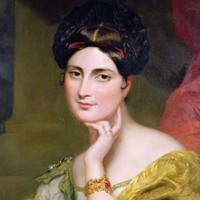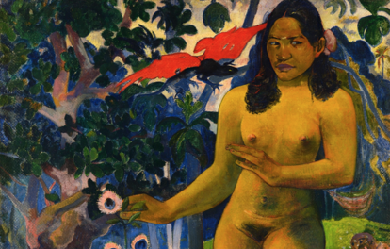The Child of the Islands - Opening
I.
OF all the joys that brighten suffering earth,
What joy is welcomed like a new-born child?
What life so wretched, but that, at its birth,
Some heart rejoiced—some lip in gladness smiled?
The poorest cottager, by love beguiled,
Greets his new burden with a kindly eye;
He knows his son must toil as he hath toiled;
But cheerful Labour, standing patient by,
Laughs at the warning shade of meagre Poverty!
II.
The pettiest squire who holds his bounded sway
In some far nook of England’s fertile ground,
Keeps a high jubilee the happy day
Which bids the bonfires blaze, the joybells sound,
And the small tenantry come flocking round,
While the old steward triumphs to declare
The mother’s suffering hour with safety crowned;
And then, with reverent eyes, and grey locks bare,
Falters—'GOD bless the Boy!' his Master’s Son and Heir!
III.
The youthful couple, whose sad marriage-vow
Received no sanction from a haughty sire,
Feel, as they gaze upon their infant’s brow,
The angel, Hope, whose strong wings never tire—
Once more their long discouraged hearts inspire;
Surely, they deem, the smiles of that young face,
Shall thaw the frost of his relentless ire!
Homeward they turn in thought; old scenes retrace;
And, weeping, yearn to meet his reconciled embrace!
IV.
Yea, for this cause, even SHAME will step aside,
And cease to bow the head and wring the heart;
For she that is a mother, but no bride,
Out of her lethargy of woe will start,
Pluck from her side that sorrow’s barbéd dart,
And, now no longer faint and full of fears,
Plan how she best protection may impart
To the lone course of those forsaken years
Which dawn in Love’s warm light, though doomed to set in tears!
V.
The dread exception—when some frenzied mind,
Crushed by the weight of unforeseen distress,
Grows to that feeble creature all unkind,
And Nature’s sweetest fount, through grief’s excess,
Is strangely turned to gall and bitterness;
When the deserted babe is left to lie,
Far from the woeful mother’s lost caress,
Under the broad cope of the solemn sky,
Or, by her shuddering hands, forlorn, condemned to die:
VI.
Monstrous, unnatural, and MAD, is deemed,
However dark life’s Future glooms in view,
An act no sane and settled heart had dreamed,
Even in extremity of want to do!
And surely WE should hold that verdict true,
Who, for men’s lives—not children’s—have thought fit
(Though high those lives were valued at their due)
The savage thirst of murder to acquit,
By stamping cold revenge an error of crazed wit!
VII.
She—after pains unpitied, unrelieved—
Sate in her weakness, lonely and forlorn,
Listening bewildered, while the wind that grieved,
Mocked the starved wailing of her newly born;
Racking her brain from weary night till morn
For friendly names, and chance of present aid;
Till, as she felt how this world’s crushing scorn,
Passing the Tempter, rests on the Betrayed,—
Hopeless, she flung to Death the life her sin had made!
VIII.
Yes, deem her mad! for holy is the sway
Of that mysterious sense which bids us bend
Toward the young souls new clothed in helpless clay,—
Fragile beginnings of a mighty end,—
Angels unwinged,—which human care must tend
Till they can tread the world’s rough path alone,
Serve for themselves, or in themselves offend.
But God o’erlooketh all from His high throne,
And sees, with eyes benign, their weakness—and our own!
IX.
Therefore we pray for them, when sunset brings
Rest to the joyous heart and shining head;
When flowers are closed, and birds fold up their wings,
And watchful mothers pass each cradle-bed
With hushed soft steps, and earnest eyes that shed
Tears far more glad than smiling! Yea, all day
We bless them; while, by guileless pleasure led,
Their voices echo in their gleesome play,
And their whole careless souls are making holiday.
X.
And if, by Heaven’s inscrutable decree,
Death calls, and human skill be vain to save;
If the bright child that clambered to our knee,
Be coldly buried in the silent grave;
Oh! with what wild lament we moan and rave!
What passionate tears fall down in ceaseless shower!
There lies Perfection!—there, of all life gave—
The bud that would have proved the sweetest flower
That ever woke to bloom within an earthly bower!
XI.
For, in this hope our intellects abjure
All reason—all experience—and forego
Belief in that which only is secure,
Our natural chance and share of human woe.
The father pitieth David’s heart-struck blow,
But for himself, such augury defies:
No future Absalom his love can know;
No pride, no passion, no rebellion lies
In the unsullied depth of those delightful eyes!
XII.
Their innocent faces open like a book,
Full of sweet prophecies of coming good;
And we who pore thereon with loving look,
Read what we most desire, not what we should;
Even that which suits our own Ambition’s mood.
The Scholar sees distinction promised there,—
The Soldier, laurels in the field of blood,—
The Merchant, venturous skill and trading fair,—
None read of broken hope—of failure—of despair!
XIII.
Nor ever can a Parent’s gaze behold
Defect of Nature, as a Stranger doth;
For these (with judgment true, severe, and cold)
Mark the ungainly step of heavy Sloth,—
Coarseness of features,—tempers quickly wroth:
But those, with dazzled hearts such errors spy,
(A halo of indulgence circling both
The plainest child a stranger passes by,
Shews lovely to the sight of some enamoured eye!
XIV.
The Mother looketh from her latticed pane—
Her Children’s voices echoing sweet and clear:
With merry leap and bound her side they gain,
Offering their wild field-flow’rets: all are dear,
Yet still she listens with an absent ear:
For, while the strong and lovely round her press,
A halt uneven step sounds drawing near:
And all she leaves, that crippled child to bless,
Folding him to her heart, with cherishing caress.
XV.
Yea, where the Soul denies illumined grace,
(The last, the worst, the fatallest defect
SHE, gazing earnest in that idiot face,
Thinks she perceives a dawn of Intellect:
And, year by year, continues to expect
What Time shall never bring, ere Life be flown:
Still loving, hoping,—patient, though deject,—
Watching those eyes that answer not her own,—
Near him,—and yet how far! with him,—but still alone!
XVI.
Want of attraction this love cannot mar:
Years of Rebellion cannot blot it out:
The Prodigal, returning from afar,
Still finds a welcome, giv’n with song and shout!
The Father’s hand, without reproach or doubt,
Clasps his,—who caused them all such bitter fears:
The Mother’s arms encircle him about:
That long dark course of alienated years,
Marked only by a burst of reconciling tears!
XVII.
CHILD OF THE ISLANDS! if the watch of love
To even the meanest of these fates belong,
What shall THINE be, whose lot is far above
All other fortunes woven in my song?
To guard THY head from danger and from wrong,
What countless voices lift their prayers to Heaven!
Those, whose own loves crowd round, (a happy throng!)
Those, for whom Death the blessed tie hath riven;
And those to whose scathed age no verdant branch is given!
XVIII.
There’s not a noble matron in the land,
Whose christen’d heir in gorgeous robes is drest,—
There’s not a cottage mother, whose fond hand
Rocks the low cradle of her darling’s rest,—
By whom THOU art not thought upon and blest!
Blest for thyself, and for HER lineage high
Who lull’d thee on her young maternal breast;
The Queenly Lady, with the clear blue eye,
Through whom thou claimest love, and sharest loyalty!
XIX.
They pray for THEE, fair child, in Gothic piles,
Where the full organ’s deep reverberate sound
Rolls echoing through the dim cathedral aisles,
Bidding the heart with inward rapture bound,
While the bent knee sinks trembling to the ground.
Till, at the signal of some well-known word,
The white-robed choristers rise circling round;
Mingling clear voices with divine accord,
In Hallelujahs loud, that magnify the Lord!
XX.
They pray for THEE in many a village church,
Deep in the shade of its sequester’d dell,
Where, scarcely heard beyond the lowly porch,
More simple hymns of praise less loudly swell;
Oft led by some fair form,—remember’d well
In after years among the grateful poor—
Whose lot it is in lordly halls to dwell,
Thence issuing forth to seek the cotter’s door,
Or tread with gentle feet the sanded schoolhouse floor.
XXI.
They pray for THEE, in floating barks that cleave
Their compass-guided path along the sea;
While through the topmast shrouds the keen winds grieve,
As through the branches of some giant tree;
And the surf sparkles in the vessel’s lee.
Par from thine Albion’s cliffs and native home,
Each crew of loyal mariners may be,
But, mingling with the dash of Ocean’s foam,
That prayer shall rise, where’er their trackless course they roam.
XXII.
And where, all newly on some foreign soil
Transplanted from the o’erpeopled Fatherland,
(Where hardy enterprise and honest toil
Avail’d them not) the Emigrant’s thin band,
Gather’d for English worship, sadly stand;
Repressing wandering thoughts, which vainly crave
The Sabbath clasp of some familiar hand,
Or yearn to pass the intervening wave
And wet with Memory’s tears some daisy-tufted grave:—
XXIII.
There, even there, THY name is not forgot—
Child of the land where they were children too!
Though sever’d ties and exile be their lot,
And Fortune now with different aspect woo,—
Still to their country and religion true,
From them the Indian learns, in broken phrase,
To worship Heaven as his converters do;
Simply he joins their forms of prayer and praise,
And, in Thy native tongue, pleads for Thy valued days.
XXIV.
Yea, even Earth, the dumb and beautiful,
Would seem to bid Thee welcome—in her way;
Since from her bosom thou shalt only cull,
Choice flowers and fruits, from blossom and from spray.
Spring—Summer—Autumn—Winter—day by day,
Above thy head in mystery shall brood;
And every phase of glory or decay,
And every shift of Nature’s changeful mood,
To THEE shall only bring variety of good!
XXV.
No insufficient harvest’s poverty,
One grain of plenty from thy store can take;
No burning drought that leaves green meadows dry,
And parches all the fertile land, shall make
The fountains fail, where thou thy thirst shalt slake!
The hardest winter that can ever bind
River, and running rill, and heaving lake,
With its depressing chain of ice, shall find
An atmosphere round THEE, warm as the summer wind!
XXVI.
From woes which deep privations must involve,
Set in luxurious comfort far aloof,
THOU shalt behold the vanishing snow dissolve,
From the high window and the shelter’d roof;
Or, while around thee, webs of richest woof
On gilded pillars hang in many a fold;
Read, in wise books, writ down for thy behoof,
(Sounding like fables in the days of old!)
What meaner men endure from want and pinching cold.
XXVII.
Oh, since this is, and must be, by a law
Of God’s own holy making, shall there not
Fall on thy heart a deep, reflecting awe,
When thou shalt contemplate the adverse lot
Of those by men, but not by Heaven, forgot?
Bend to the lowly in their world of care;
Think, in thy Palace, of the labourer’s cot;
And justify the still unequal share
By all they power to aid, and willingness to spare!



